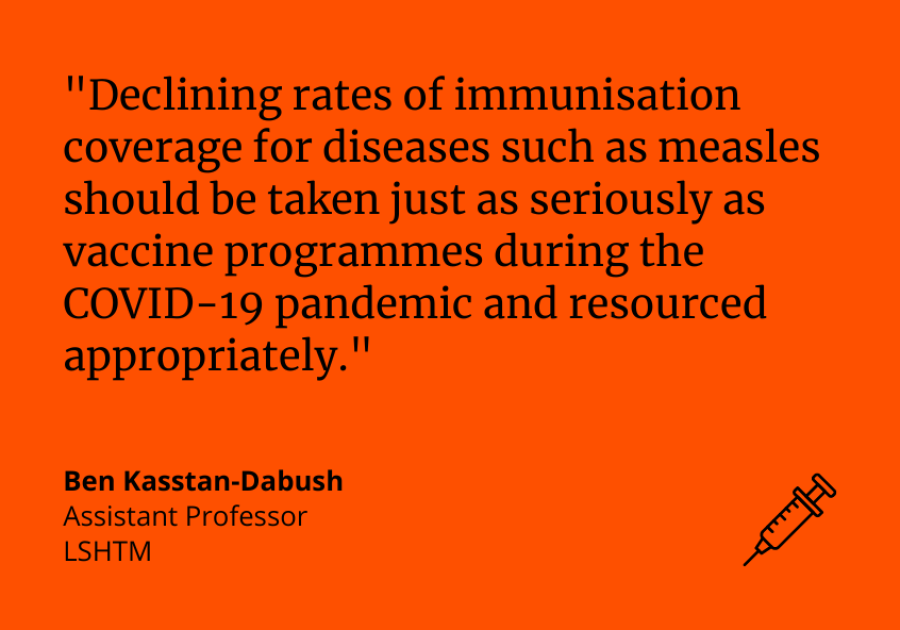Expert Comment – Measles vaccine uptake must increase in UK
5 February 2024 London School of Hygiene & Tropical Medicine London School of Hygiene & Tropical Medicine https://lshtm.ac.uk/themes/custom/lshtm/images/lshtm-logo-black.png
Declining rates of immunisation coverage for diseases such as measles should be taken just as seriously as vaccine programmes during the COVID-19 pandemic and resourced appropriately.” Ben Kasstan-Dabush, Assistant Professor, LSHTM
Following an increase in reported cases of measles across the UK, the UK Health Security Agency (UKHSA) has declared a national incident and initiated a public campaign to increase childhood vaccination against the disease.
The declaration signals a growing public health risk and the need for immediate action to boost vaccine uptake across communities where uptake is low, to limit further spread.
In the UK, the Measles, Mumps and Rubella (MMR) vaccine is part of the National Health Service (NHS) Routine Childhood Immunisation Programme – with one dose offered at one year and another second dose at three years and four months.
Over 99% of those who have two doses of the MMR vaccine will be protected against measles and rubella. The vaccine also provides protection against mumps, and although its level of protection is slightly lower, cases in vaccinated people are much less severe.
Parents whose infants missed out, or anyone of any age who has not yet had a vaccine, are urged to speak to their GP.
Speaking about the rise in cases and the need for urgent action, Professor Beate Kampmann, Director of the IMmunising PRegnant Women and INfants neTwork (IMPRINT) at the London School of Hygiene & Tropical Medicine (LSHTM), said:
“Measles is not a harmless infectious disease. For every 1,000 children who get measles, one or two may die.
“We have an effective Measles, Mumps and Rubella (MMR) vaccine available but measles can spread very easily among those who are unvaccinated. To keep cases low, 95% of the population needs to be vaccinated and unfortunately, the current coverage is well below this target.
“If you want to protect your child and your community, get the vaccine.”
Dr Ben Kasstan-Dabush, Assistant Professor in Medical Anthropology at LSHTM, said:
“The recent statistics released by the UKHSA reveal the consequences of declining rates of child and adolescent immunisation coverage.
“While a decrease in vaccine confidence or an increase in ‘hesitancy’ has been linked, there are many other factors that need to be considered to ensure we develop the right interventions.
“Declining coverage is happening amidst an unforgiving cost of living crisis, characterised by a generational decline in living standards, political austerity and unequal pandemic recovery. There are clear links between deprivation and lower immunisation coverage because uncertainty affects so many aspects of a parent’s life.
“To reverse the decline in vaccine uptake, immunisation services require sufficient resources to effectively engage communities and ensure capacity. Typical vaccine delivery pathways, such as primary care through GPs, tend to be acceptable to most parents. However, communities living in urban or more deprived neighbourhoods may not have easy access to these services and may need tailored engagement, such as the use of health visitors.
“The UK lost its World Health Organization measles elimination status in 2019. Five years later, the prospect of re-gaining this status feels further than ever.
“The COVID-19 vaccination programme was a lesson for the UK Government in ‘putting money where your mouth is’ to bolster vaccine coverage and to address inequalities. Declining rates of immunisation coverage for diseases such as measles should be taken just as seriously as vaccine programmes during the COVID-19 pandemic and resourced appropriately.”
If you enjoyed this article and would like to build a career in global health, we offer a range of MSc programmes covering health and data, infectious and tropical diseases, population health, and public health and policy.
Available on campus or online, including flexible study that works around your work and home life, be part of a global community at the UK's no.1 public health university.